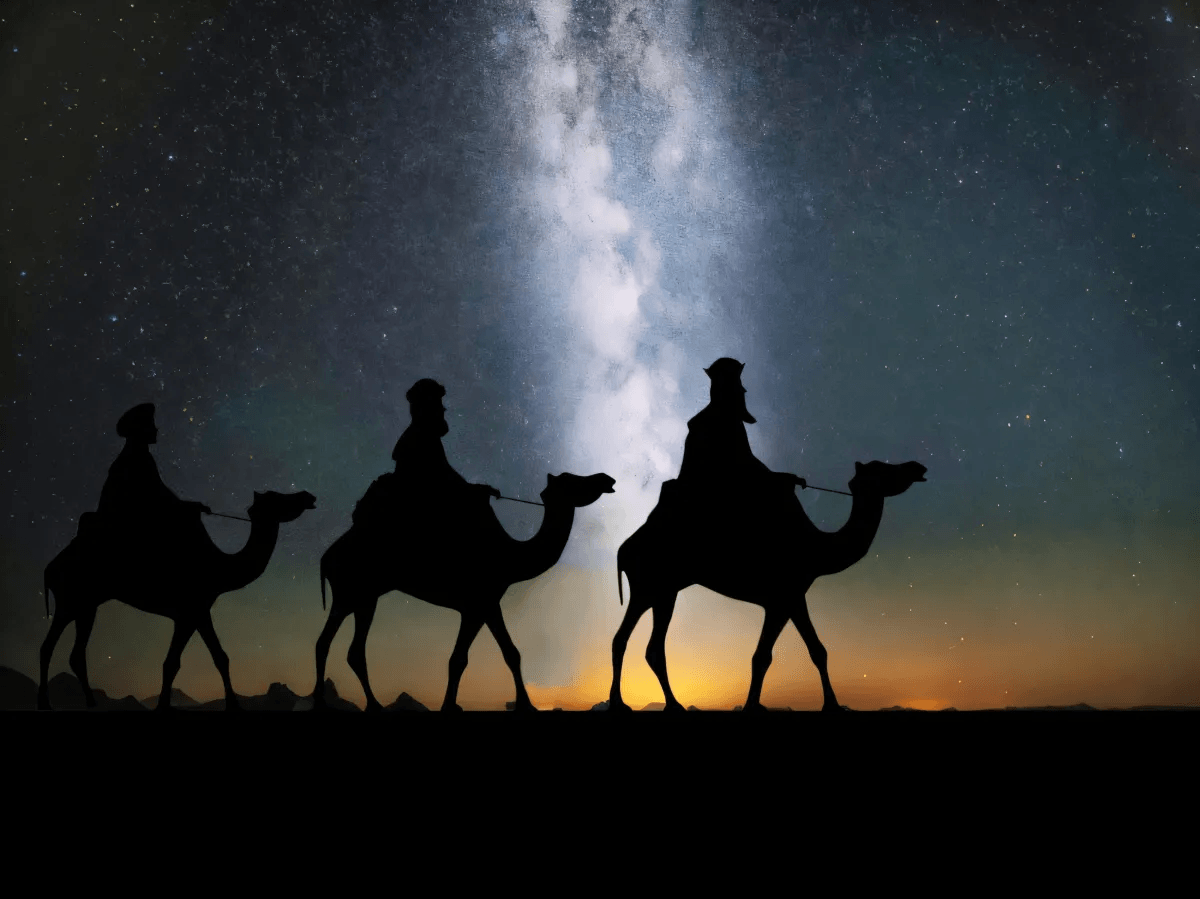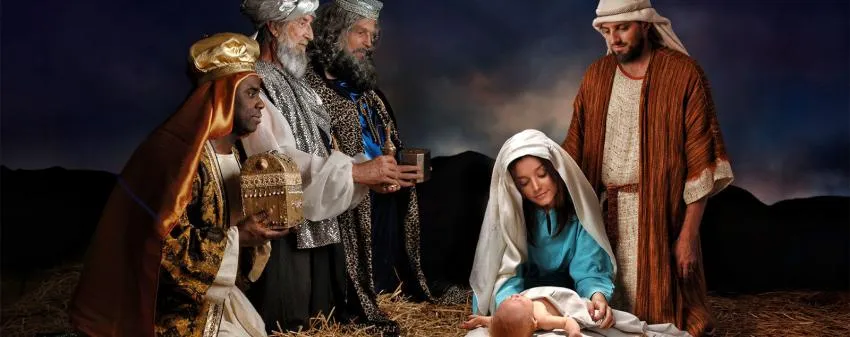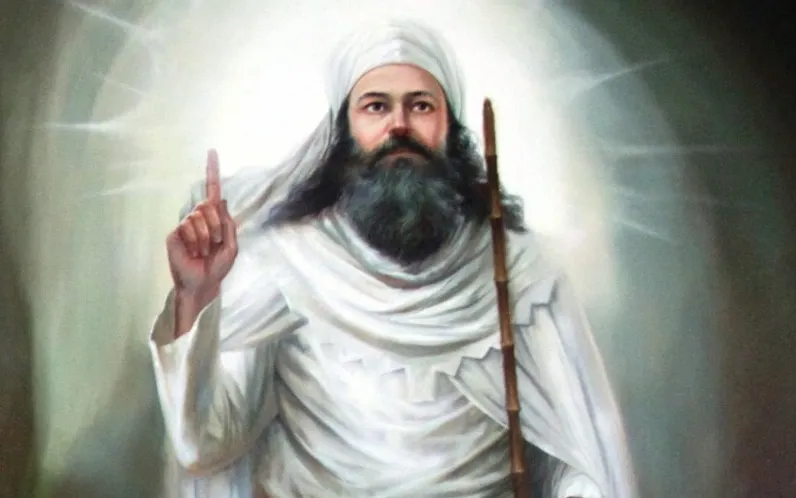Were The Three Wise Men Persian Magi?
The tradition of the Three Wise Men or the Three Magi has been celebrated for centuries in different parts of the world on the day of January 6.
On the evening of January 5, all the children go out to gather grass or hay to give the camels or horses (depending on which version of the story you look at) of the Three Wise Men, and then go to bed dreaming of the presents the Three Wise Men would leave them the next day.
We all know the story of how the Three Wise Men traveling with the guidance of the Star of Bethlehem and gifting baby Jesus myrrh, gold, and incense. We also know about how there was a fourth Wise Man, Artaban, who got lost and arrived after Jesus' death.
But is that all there is to this story? Were there really three Wise Men that went to see Jesus? Were they truly just researchers of knowledge and well educated?
Let us find out who the Wise Men were and where did this tradition come from.

How The Three Wise Men Came To Be?
The concept of the Three Magi took form throughout time, having been added to by philosophers, artists, and scholars.
According to National Geographic, the Three Wise Men first appeared as a priestly caste from Media and Persia.
Later on, in the third century, a theologist and writer named Origins proposed that there had been three Magis who visited Jesus because of the three gifts that were presented to the baby.
Second-century paintings from the Santa Priscila catacombs presented the Wise Men as three noble Persians, states National Geographic.
In the VIII century, the Magi were depicted as kings and also got their names: Melchior (Melchor), Gathaspa (Gaspar or Casper), and Bithisarea (Baltazar).
Depictions of the Three Magi
The three main Wise Men were described with different characteristics representing different parts of the world that were known at that time.
Melchor was described as an old, white man with a white beard. He represented the white European races from the north, as well as the concept of old age.
Gaspar is often shown with brown hair and a brown beard. The second Magi represents the Asian races and youth.
Baltazar, with his black skin, is sometimes portrayed with or without facial hair. He is representative of Africa, as well as the concept of maturity.

Wise Men vs Magi
You might have noticed that in this article "Wise Men" and "Magi" are used interchangeably. This is because in Spanish the title of The Three Wise Men is "Los Tres Reyes Magos". Translated literally it is The Three Magi Kings.
Throughout the ages scholars, theologists, and devotees alike have struggled with the term "Magi" whenever it is referred to Melchior, Gaspar, and Baltazar defending that the three did not practice magic at all but were just well-educated men.
Many consider that "Magi" is just a reference to "wise men".
The Greek term "Magoi" designates men of various educated classes. These Wise Men were not magicians in the modern sense of performing magic. They were of noble birth, educated, wealthy, and influential. They were men of integrity.
- El Deseado de Todas las Gentes (book)
Still "Magi" persists in some denominations that the Wise Men are given.
Where the Wise Men were said to come from might be the reason why in many places they are still referred to as Magi.
The Three Wise Men were Persian
Ancient texts and beliefs place the origin of the Three Wise Men in either Persia (Iran) or adjacent lands. More specifically, they were said to be from the Orient or the East of Palestine.
From the 1st millennium BCE (B.C.) and until the 7th century CE (A.D.) when Muslims invaded, the Persians, although of diverse ancestry, practiced what is now known as Zoroastrianism, states the Britannica Encyclopedia.
And, according to Biblical Archeology, the majority of scholars place the birth of Jesus in 4 B.C. or before. This means that when Jesus was born, Zoroastrianism was still strongly practiced in Persia.
Stephen E. Flowers, Ph.D., states in his book Original Magic: The Rituals and Initiations of the Persian Magi that:
The prestige and reputation of the Magian priests of Mazda are nowhere clearer than in the Christian story of the Three Wise Men. This short narrative tells of the group of magoi or magi that visited the recently born Jesus.
The point of the existence of this story is that early Christians wanted to show that they had the approval of the Magians, then thought to be the most prestigious priesthood in the world.
-Stephen E. Flowers , Ph.D.

What is Zoroastrianism?
Zoroastrianism or Mazdayasna is one of the oldest practiced religions based on the teachings of Zarathustra or Zoroaster, as the Greek called him.
It is said that Zarathustra was born into a polytheistic religion but after getting a vision of a single supreme entity he began to teach others to mainly worship the god Ahura Mazda.
Zoroastrianism is believed to have helped shaped the three main religions of today, Judaism, Christianity, and Islam, by introducing the beliefs and concepts of the idea of a single god, heaven, hell, and a day of judgment. Which these three religions didn't have before coming in contact with Zoroastrianism.
In Zoroastrianism, they also believed in a version of the ultimate battle between good and evil. It was said that their god Ahura Mazda was in a constant battle with Angra Mainyu which represented everything bad and evil. This is the reason that Zoroastrianism is also said to be a religion of dualism.
Fire and water were important tools for the Parsis (as the followers of Zoroastrianism became known after becoming refugees due to the Muslim invasion of Persia).
The Parsis considered fire and water as purification tools, they had fire temples that contained an altar with a flame that was never extinguished, according to History. Truth and righteousness were very important values for them.
Persian Magic
According to Stephen A. Flowers, Ph.D., that mazdan magic (craft of the magu), is not sorcery like many Greeks and Romans of ancient times tried to make other people believe, instead, it is a combination of spiritual wisdom or insight and science by which things are revealed and/or made to happen.
Persian magic is the applied science of ritual and cosmology.
As Zoroastrianism came in contact with other cultures, many outsiders couldn't comprehend their teachings and so they tried to make others believe that the magavans (Magians) were sorcerers or practitioners of witchcraft that would harm others.
This is probably one of the reasons why today, people still have trouble with identifying the Three Wise Men as Magi.
Persian Mageia was seen either as horrible witchcraft or as a system of spiritual and intellectual enlightenment, depending on the camp to which the writer belonged.
Those Greeks who opposed the Persians saw their ideology as witchcraft; those who admired them called it philosophia.
- Stephen A. Flowers Ph.D.
The Magi were definitely well educated and famed for their astrological knowledge, which they borrowed from the Egyptians and Mesopotamians.
The Magi were the first to systematize astrology into a system of magic that they used in their own science and cast horoscopes. So good were they with astrology that they were credited with its invention even though they only perfected it.
The Magi were also credited with the invention of magic by Pliny the Elder, a famed first-century CE historian, even though again, they did not.
So, were the Three Wise Men Magi?
According to many studies and researchers, it seems to be that they were indeed Persian Magi and they did practice "magic".
Hopefully, this doesn't discourage anyone from celebrating this sacred holiday as many still argue that the Three Magi weren't magicians that practiced magic. Research states otherwise.
Nevertheless, it is a beautiful tradition and story that contains many lessons regardless of individual opinions. Keep celebrating and keep believing.
Opinions and Perspectives
The evolution of their story shows how traditions can maintain meaning while adapting to different cultures.
Their combination of scientific and spiritual knowledge really was ahead of their time.
The tradition feels even more meaningful knowing about their possible historical origins.
I'm fascinated by how their story represents an early example of interfaith respect and recognition.
Understanding their background as Persian priests adds such rich context to the traditional story.
The details about their astronomical knowledge really enhance the Star of Bethlehem narrative.
Their role as respected priests rather than mysterious sorcerers makes the story more relatable.
It's amazing how this tradition has survived and evolved over thousands of years.
The way they combined spiritual wisdom with scientific knowledge is quite modern in concept.
Learning about their true historical context makes the celebration even more special.
The article really helps explain why different cultures interpret the Magi differently.
Their astronomical expertise being borrowed from multiple cultures shows how knowledge transcended borders.
The connection to fire temples and purification rituals adds interesting context to their religious practices.
Understanding their background makes the gifts they brought even more meaningful.
The evolution from Persian priests to kings shows how stories adapt over time.
Their role as educated priests rather than magical practitioners feels more historically accurate.
The contrast between Greek interpretations of their practices really shaped historical perspectives.
I find it remarkable how this tradition has maintained its significance across different cultures.
Their astronomical knowledge being advanced enough to follow a star seems more plausible now.
The explanation of Persian magic as spiritual wisdom makes so much more sense than supernatural powers.
Fascinating how their reputation survived even after their religion declined in Persia.
The influence of Zoroastrianism on modern religions is honestly mind-blowing.
The article really clarifies why there's been such confusion about the term 'Magi' throughout history.
The tradition seems even richer now knowing about their possible Persian origins.
Love learning about the original meaning of Magoi as educated men rather than magicians.
The timing of Jesus's birth coinciding with Zoroastrianism's prominence is quite significant historically.
Their knowledge of astrology being borrowed from Egyptians and Mesopotamians shows how knowledge spread in ancient times.
The description of them representing youth, maturity, and old age adds another symbolic layer I never knew about.
I'm curious about how they actually practiced their astronomy. Must have been quite advanced for their time.
The detail about Pliny the Elder crediting them with inventing magic shows how influential they were.
The way different cultures interpreted Persian magic really shaped how we view the Wise Men today.
I appreciate how the article explains the evolution of their portrayal from priests to kings.
The early Christian effort to get Magian approval shows how interconnected ancient religious traditions were.
Does anyone else find it fascinating that they were considered the most prestigious priesthood in the world at that time?
I think the article does a great job explaining how Persian magic was actually more scientific than supernatural.
The connection between Zoroastrian beliefs and modern religions is eye-opening. We really are all connected.
Understanding their background as educated priests rather than magical practitioners adds credibility to the story.
I've always wondered about the origin of their names. The eighth century date helps put it in perspective.
The part about them being well-educated nobles rather than mystical sorcerers makes more sense historically.
Pretty interesting that it took until the third century for someone to connect the three gifts to there being three Wise Men.
I'm struck by how the story evolved to become more inclusive with the three men representing different parts of the world.
The tradition of leaving grass for the animals feels more meaningful now knowing the historical background of these figures.
This reminds me of visiting Iran and seeing Zoroastrian influences still present in the culture.
Learning about their connection to astrology makes their ability to follow the star more credible to me.
The description of Persian magic as applied science and cosmology is fascinating. Really changes my perspective on what they might have practiced.
I never understood why they were sometimes called Magi until reading this. The terminology confusion goes back centuries!
The timing makes perfect sense considering Jesus was born when Zoroastrianism was still prominent in Persia.
You're all missing the point. Whether they were actual Magi or not doesn't change the meaning of the celebration.
I love how the article explains the difference between actual Persian magic and how Greeks and Romans misinterpreted it.
Looking at it historically, their depiction has changed so much over time. Original paintings showed them as Persian priests, not kings.
This explains why my family always called them Los Reyes Magos instead of just Wise Men. The terminology has such deep roots.
The fire temples with never-ending flames sound incredible. I wonder if any still exist in modern-day Iran.
I disagree with the assumption they were Persian. Couldn't they have been from other parts of the East?
The connection between the Magi and astrology makes perfect sense considering they followed the Star of Bethlehem.
My grandmother used to tell us to leave grass for the camels on January 5th. Now I understand the historical context behind this tradition.
The fourth Wise Man story about Artaban is new to me. I'd love to learn more about that part of the tradition.
I find it interesting that it wasn't until the 8th century that they got their names and were depicted as kings. Really shows how stories evolve over time.
Actually, if you read carefully, their 'magic' was more like scientific knowledge and spiritual wisdom. It's not the kind of magic we think of today.
The way they represented different parts of the known world through Melchior, Gaspar, and Baltazar is really meaningful. Shows how inclusive the story was meant to be.
Not sure I'm comfortable with the idea that the Wise Men practiced magic. I've always seen them as astronomers and scholars.
I'm surprised to learn that Zoroastrianism influenced Judaism, Christianity, and Islam. The concept of heaven and hell coming from their beliefs is mind-blowing.
What fascinates me most is how early Christians wanted the approval of the Magi. It really shows how respected these Persian priests were at the time.
I never knew the Three Wise Men might have been Zoroastrian priests! This adds such an interesting layer to the traditional story I grew up with.
